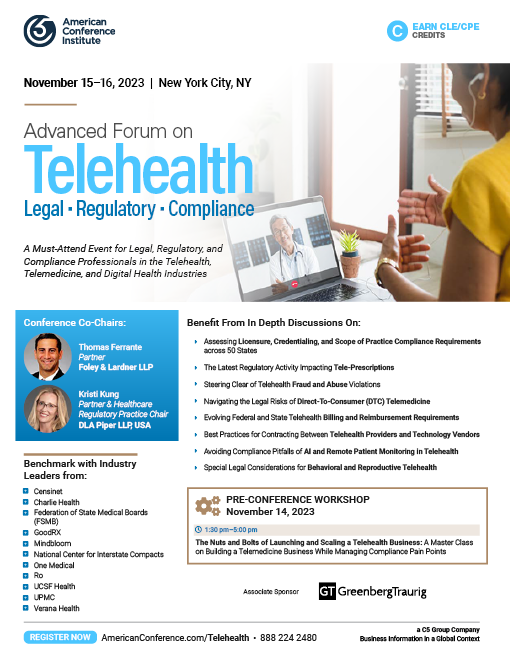Agenda

Conference Program
Flip through our 2023 conference brochure and discover what’s new this year.
- Jump to:
- At a Glance
- Day 1
- Day 2
- Add-Ons
- Print-friendly Format
Day 1 - Wednesday, November 15, 2023
Day 2 - Thursday, November 16, 2023
Post-Conference Workshop
The Nuts and Bolts of Launching and Scaling a Telehealth Business: A Master Class on Building a Telemedicine Business While Managing Compliance Pain Points
Nov 16, 2023 3:15pm – 06:00 PM
Speakers

Eugene Karlik
General Counsel
Charlie Health

Nathaniel Lacktman
Chair, Telemedicine & Digital Health Industry Team
Foley & Lardner LLP

Jeremy D. Sherer
Partner
Hooper Lundy & Bookman, P.C.
Day 1 - Wednesday, November 15, 2023
| 8:45 |
Co-Chairs’ Opening RemarksThe Evolving Telehealth Landscape Post-COVID 19: Examining the Opportunities, Challenges and Risks of the Remote Care Revolution Thomas Ferrante  Kristi Kung Following the rapid rise of telemedicine spawned by the COVID-19 pandemic, healthcare entities and telemedicine companies are now shifting their focus to the operational, legal, and compliance considerations associated with long term telehealth adoption. In this opening session, our esteemed co-chairs will set the stage for the conference with a high-level exploration of the current and emerging telehealth landscape and the regulatory framework currently governing telehealth practices and services. |
| 9:15 |
Navigating the 50-State Compliance Framework Governing the Licensing and Credentialing of Telehealth Providers Dan Logsdon  Kristen McDermott Woodrum  Lisa Robin Licensure
|
| 10:15 |
Morning Coffee Break |
| 10:45 |
Maneuvering Through Evolving State Regulations on the Scope of Practice for Telehealth Providers and Establishing a Doctor/Patient Relationship Tori Lallemont  Lisa Mazur  Michael Petegorsky  Janice Tam
|
| 11:45 |
Networking Luncheon |
| 1:00 |
Understanding the Unique Legal Risks Associated with the Asynchronous DTC Telemedicine Model Melissa Bianchi  Lee Nutini
|
| 2:00 |
Ensuring Compliance with Evolving Federal and State Telehealth Billing and Reimbursement Requirements In the Wake of the COVID-19 Public Health Jody Erdfarb  Rebecca Simone
|
| 3:00 |
Afternoon Break |
| 3:15 |
Case StudyEnsuring Non-Discrimination in Telemedicine: Facilitating Telehealth Equity and Accessibility in Compliance with Federal Laws
|
| 3:45 |
Spotlight on Cybersecurity: Navigating the Data Privacy and Protection Landmines that Plague Telehealth Christopher Logan  Carolyn Metnick  Nicholas Heesters
|
| 4:45 |
The Role of AI in Remote Care: Exploring the Latest Applications, Opportunities, Ethical Implications and Compliance Challenges Dan Kagan  Michelle McGovern
|
| 5:30 |
Conference Adjourns |
Day 2 - Thursday, November 16, 2023
| 8:45 |
Opening Remarks from the Co-Chairs: Welcome Back & Recap of Day 1 Thomas Ferrante  Kristi Kung |
| 9:00 |
Tele-Prescribing in the Crosshairs: Navigating the Latest Regulatory Activity Coming From the DEA, HHS, and Other Agencies Governing Tele-Prescriptions of Controlled Substances Libby Baney  Thomas Ferrante  Hilda Gurley  Kaytie M. Ravega
|
| 10:00 |
Telehealth Fraud and Abuse: Steering Clear of The Next Frontier in F&A, False Claims Act and Qui Tam Enforcement Roger Cohen  Marc Goldsand  Brian McEvoy
|
| 11:00 |
Morning Coffee Break |
| 11:15 |
Remote Patient Monitoring in Telehealth: Avoiding Key Compliance Pitfalls and Understanding When FDA Regulation and Oversight Comes Into Play Carrie Nixon  Carol Yarbrough  Benjamin M. Zegarelli
|
| 12:15 |
Networking Luncheon |
| 1:15 |
Best Practices for Contracting Between Telehealth Providers, Technology Vendors, and Life Sciences Companies Rujul Desai  Charles C. Dunham, IV
|
| 2:00 |
Afternoon Break |
| 2:15 |
Special Legal Considerations and Risks for Providers of Behavioral, Reproductive and Gender Affirming Healthcare Via Telemedicine Lisa Kechijian  Kristi Kung
|
| 3:00 |
Closing Remarks – Conference Ends |
The Nuts and Bolts of Launching and Scaling a Telehealth Business: A Master Class on Building a Telemedicine Business While Managing Compliance Pain Points

Eugene Karlik
General Counsel
Charlie Health

Nathaniel Lacktman
Chair, Telemedicine & Digital Health Industry Team
Foley & Lardner LLP

Jeremy D. Sherer
Partner
Hooper Lundy & Bookman, P.C.
What is it about?
As the scope of telehealth and telemedicine continues to grow in the post-COIVD era, more and more people are looking to establish their own tele-practice, take their practice to the national or international level, or partner with an already established healthcare company. Given the rapidly evolving regulatory landscape, and the fact that telehealth at its core employs meticulously designed and secured protocols and technologies – launching or expanding a telehealth business can be a complicated and intimidating endeavor.
This workshop will provide you with a comprehensive deep dive into the full spectrum of operational considerations needed to break-into and thrive or to expand more practices in the telehealth market, while navigating critical compliance pain points.
Topics will include:
- A step-by-step guide to launching a telemedicine practice or telehealth startup including the basics, such as:
- Considering the choice of entities and incorporation
- Establishing an employer identification number and a national provider identifier
- Certification requirements
- Selecting the appropriate insurance coverage
- Designing the patient-facing front end of your business
- Navigating laws and rules to expedite multistate expansion
- An overview of telehealth operation essentials, including:
- Licensing, enrollment and credentialing requirements
- DEA registration
- Medical billing/reimbursements
- HIPAA compliant audio-video technologies
- Privacy concerns